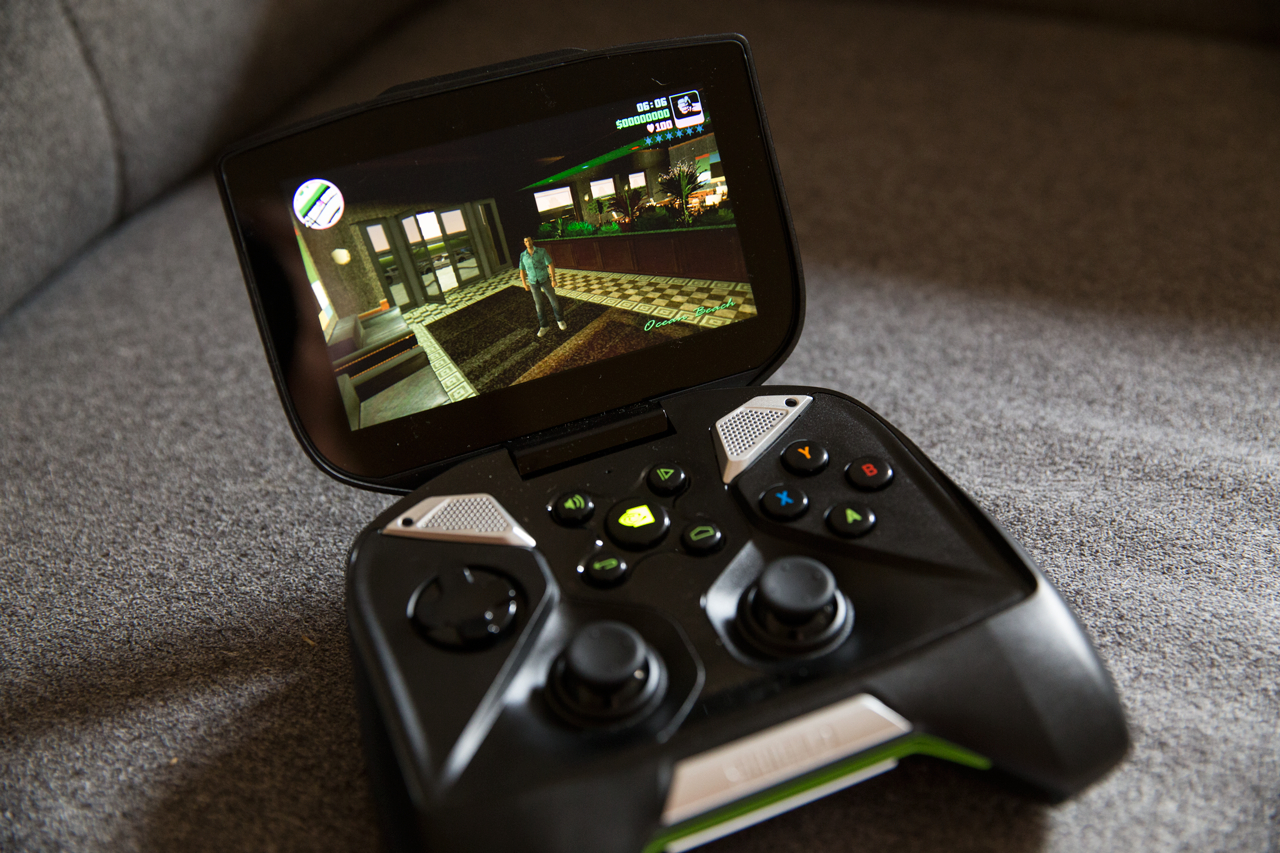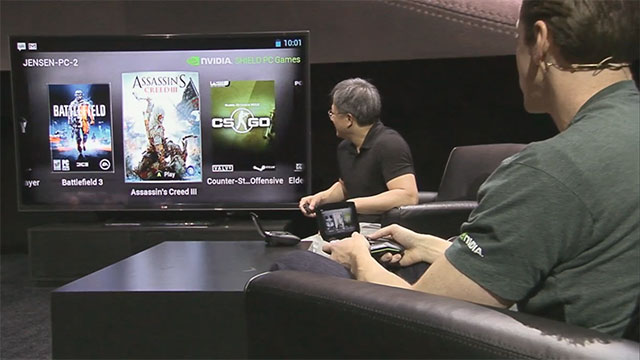
Powered by the world’s fastest mobile processor and billed by its maker as “the ultimate gaming and entertainment portable” the Nvidia Shield is in many way the realisation of thousands of tech fans’ nerdiest dreams: a genuinely powerful portable built around a home console-quality controller with a potentially vast software library. Offering gamers the chance to play games like Borderlands 2 and Skyrim anywhere from their bedroom to the toilet, the Shield at once steals both Nintendo’s “play with the TV off” Wii U thunder and makes Sony’s plans to have all forthcoming PlayStation 4 titles also playable on Vita seem like a copycat move, so it’s little wonder that the console has received a ton of attention the world over.
Currently only available in the US and Canada, lovers of all things sleek and shiny here in Japan who couldn’t wait any longer for an official release have laid down their cash (and with the portable retailing for US$299 that’s nothing to be sneezed at) and imported a Shield for themselves.
Little do they know, however, that simply by powering the thing up within the Land of the Rising Sun they’ll be breaking the law.
It may look a little bit like the portable Xbox than never was, but GPU maker Nvidia’s first ever portable is a completely different beast. Featuring a five-inch multi-touch display that is attached to a high quality controller complete with analogue sticks and shoulder triggers, the console runs not just applications from the Google Play store but streams full, big-budget games from capable Windows PCs, allowing gamers to play big-screen titles anywhere they like so long as it’s within reach of their wireless signal.
To do that, the device requires a strong wireless connection in order to send and receive data at speeds fast enough to make gameplay enjoyable. And that is where we run into a small, but very irritating, legal issue.
Under Japan’s strict Radio Act laws, it is illegal to operate any device that emits a wireless signal unless it has been approved (and carries an official sticker of said approval) for use in Japan and meets standards with regard to signal strength and accessibility. Back when the original iPad launched in North America, for example, millions of Japanese–who had just recently hopped on the iPhone train and couldn’t get enough of Apple–were eager to beat their tech-loving friends and grab one of their own tablets prior to the Japanese release. However, in doing so many ran into problems.
▼ The Shield’s streaming function is perhaps its greatest strength.
Japanese law allows those visiting the country to operate their non-approved WiFi-enabled devices without a license, so there’s no need to worry if you’re planning on visiting and bringing your laptop, iPad or PlayStation Vita with you, but those found to be importing and operating devices that have not been approved under Japan’s Radio Act are, technically, bound by the law and could face prosecution or fines should they dare to fire their machine up. For that reason, you won’t currently find any hands-on reviews of Nvidia’s fledgling console on Japanese websites (unless, of course, they tested the device outside the country first), which explains why sites like 4Gamer.net (Japanese only) are having to make do with features focusing entirely on the console’s exterior, despite having paid to import the thing.
Some argue that laws pertaining to the use of wireless communication devices in Japan are as strict as they are because of the country’s terrain, suggesting that since so much of the population is squeezed into relatively small spaces, without limits on the strength of wireless signals, interference would be a common problem. Others argue that the country’s laws are simply behind the times and need to be rethought fast. Either way, if you’re in Japan and were thinking of picking up Nvidia’s new baby, or any other wireless device for that matter, it might be worth knowing that you could be very close to breaking the law. Whether you choose to do it anyway, of course, is entirely up to you!
Reference: 4Gamer.net (Japanese)
Top image via tctechcrunch inset image: ExtremeTech


 Mr. Sato discovers the band of his dreams: this small box
Mr. Sato discovers the band of his dreams: this small box Sony unveils bizarre new TV remote control with built-in speaker, met with confusion and LOLs
Sony unveils bizarre new TV remote control with built-in speaker, met with confusion and LOLs Our favorite photos from Day Three of E3 2014【RN24@E3】
Our favorite photos from Day Three of E3 2014【RN24@E3】 Sony ends shipments of PlayStation TV in Japan
Sony ends shipments of PlayStation TV in Japan Sony’s new Xperia Z3 compact tablet boasts PlayStation 4 remote play, controller mount
Sony’s new Xperia Z3 compact tablet boasts PlayStation 4 remote play, controller mount Randomly running into a great sushi lunch like this is one of the best things about eating in Tokyo
Randomly running into a great sushi lunch like this is one of the best things about eating in Tokyo Beautiful new Final Fantasy T-shirt collection on the way from Uniqlo【Photos】
Beautiful new Final Fantasy T-shirt collection on the way from Uniqlo【Photos】 Disney princesses get official manga makeovers for Manga Princess Cafe opening in Tokyo
Disney princesses get official manga makeovers for Manga Princess Cafe opening in Tokyo Is the new Shinkansen Train Desk ticket worth it?
Is the new Shinkansen Train Desk ticket worth it? Kyushu-exclusive Black Mont Blanc goes nationwide in a “Special” way
Kyushu-exclusive Black Mont Blanc goes nationwide in a “Special” way Cup Noodles Everything Bagel surprises ramen lovers around the world
Cup Noodles Everything Bagel surprises ramen lovers around the world Hamburg and Hamburg Shibuya: A Japanese restaurant you need to put on your Tokyo itinerary
Hamburg and Hamburg Shibuya: A Japanese restaurant you need to put on your Tokyo itinerary Tokyo restaurant’s chicken katsu mabo curry is hard to pin down, easy to love
Tokyo restaurant’s chicken katsu mabo curry is hard to pin down, easy to love Foreign English teachers in Japan pick their favorite Japanese-language phrases【Survey】
Foreign English teachers in Japan pick their favorite Japanese-language phrases【Survey】 We go looking for the free kaoyu hot spring facebath of onsen town Kusatsu【Photos】
We go looking for the free kaoyu hot spring facebath of onsen town Kusatsu【Photos】 We try out “Chan Ramen”, an underground type of ramen popular in the ramen community
We try out “Chan Ramen”, an underground type of ramen popular in the ramen community New Studio Ghibli bedding sets are cool in all senses of the word
New Studio Ghibli bedding sets are cool in all senses of the word Our Japanese reporter visits Costco in the U.S., finds super American and very Japanese things
Our Japanese reporter visits Costco in the U.S., finds super American and very Japanese things New Pokémon cakes let you eat your way through Pikachu and all the Eevee evolutions
New Pokémon cakes let you eat your way through Pikachu and all the Eevee evolutions There’s a park inside Japan where you can also see Japan inside the park
There’s a park inside Japan where you can also see Japan inside the park Japanese convenience store packs a whole bento into an onigiri rice ball
Japanese convenience store packs a whole bento into an onigiri rice ball Hanton rice — a delicious regional food even most Japanese people don’t know about, but more should
Hanton rice — a delicious regional food even most Japanese people don’t know about, but more should Final Fantasy, Kingdom Hearts, and Dragon Quest pet product line announced by Square Enix
Final Fantasy, Kingdom Hearts, and Dragon Quest pet product line announced by Square Enix Studio Ghibli releases Kiki’s Delivery Service chocolate cake pouches in Japan
Studio Ghibli releases Kiki’s Delivery Service chocolate cake pouches in Japan Japan’s bone-breaking and record-breaking roller coaster is permanently shutting down
Japan’s bone-breaking and record-breaking roller coaster is permanently shutting down New definition of “Japanese whiskey” goes into effect to prevent fakes from fooling overseas buyers
New definition of “Japanese whiskey” goes into effect to prevent fakes from fooling overseas buyers Foreign passenger shoves conductor on one of the last full runs for Japan’s Thunderbird train
Foreign passenger shoves conductor on one of the last full runs for Japan’s Thunderbird train Kyoto bans tourists from geisha alleys in Gion, with fines for those who don’t follow rules
Kyoto bans tourists from geisha alleys in Gion, with fines for those who don’t follow rules Studio Ghibli unveils Mother’s Day gift set that captures the love in My Neighbour Totoro
Studio Ghibli unveils Mother’s Day gift set that captures the love in My Neighbour Totoro Domino’s Japan now sells…pizza ears?
Domino’s Japan now sells…pizza ears? Toyota built a life-sized Miraidon Pokémon and are letting people test drive it this weekend
Toyota built a life-sized Miraidon Pokémon and are letting people test drive it this weekend New Japanese KitKat flavour stars Sanrio characters, including Hello Kitty
New Japanese KitKat flavour stars Sanrio characters, including Hello Kitty Sales of Japan’s most convenient train ticket/shopping payment cards suspended indefinitely
Sales of Japan’s most convenient train ticket/shopping payment cards suspended indefinitely Sold-out Studio Ghibli desktop humidifiers are back so Totoro can help you through the dry season
Sold-out Studio Ghibli desktop humidifiers are back so Totoro can help you through the dry season Japanese government to make first change to romanization spelling rules since the 1950s
Japanese government to make first change to romanization spelling rules since the 1950s Ghibli founders Toshio Suzuki and Hayao Miyazaki contribute to Japanese whisky Totoro label design
Ghibli founders Toshio Suzuki and Hayao Miyazaki contribute to Japanese whisky Totoro label design Doraemon found buried at sea as scene from 1993 anime becomes real life【Photos】
Doraemon found buried at sea as scene from 1993 anime becomes real life【Photos】 Tokyo’s most famous Starbucks is closed
Tokyo’s most famous Starbucks is closed One Piece characters’ nationalities revealed, but fans have mixed opinions
One Piece characters’ nationalities revealed, but fans have mixed opinions We asked a Uniqlo employee what four things we should buy and their suggestions didn’t disappoint
We asked a Uniqlo employee what four things we should buy and their suggestions didn’t disappoint Princesses, fruits, and blacksmiths: Study reveals the 30 most unusual family names in Japan
Princesses, fruits, and blacksmiths: Study reveals the 30 most unusual family names in Japan Studio Ghibli’s new desktop Howl’s Moving Castle will take your stationery on an adventure
Studio Ghibli’s new desktop Howl’s Moving Castle will take your stationery on an adventure Krispy Kreme Japan makes the dessert of our dreams: Doughnut ice cream sundaes
Krispy Kreme Japan makes the dessert of our dreams: Doughnut ice cream sundaes Sony gives PlayStation 3 game cases a facelift, netizens complain they can’t tell games apart
Sony gives PlayStation 3 game cases a facelift, netizens complain they can’t tell games apart Huawei’s “TRON” marks China’s first major entry into the games console market
Huawei’s “TRON” marks China’s first major entry into the games console market Sony’s summer PlayStation Vita ads are all about growing up【Video】
Sony’s summer PlayStation Vita ads are all about growing up【Video】 The 20 most wanted Christmas presents in Japan
The 20 most wanted Christmas presents in Japan Japanese ‘Day One Edition’ Xbox One adopters are actually getting a pretty good deal
Japanese ‘Day One Edition’ Xbox One adopters are actually getting a pretty good deal PlayStation 4 gets a price drop in Japan this October, Project Morpheus given an official name
PlayStation 4 gets a price drop in Japan this October, Project Morpheus given an official name Are you ready to watch the first music performance broadcast via PlayStation??
Are you ready to watch the first music performance broadcast via PlayStation?? Hugging, “borrowing” Wi-Fi and 8 other things that can get you arrested in Singapore
Hugging, “borrowing” Wi-Fi and 8 other things that can get you arrested in Singapore REVIEW: Sony’s new tablet is thinner and lighter than the iPad Air, and Android fans will love it
REVIEW: Sony’s new tablet is thinner and lighter than the iPad Air, and Android fans will love it Sazae Radio: Now you can hear a lot more than just the ocean in a seashell!
Sazae Radio: Now you can hear a lot more than just the ocean in a seashell! Nintendo might be using Android to power its next games console
Nintendo might be using Android to power its next games console Move over headphones, Sony’s new speakers let you blast music out of your shoulders
Move over headphones, Sony’s new speakers let you blast music out of your shoulders Upcoming PS4 and Vita title One Way Trip is one of the trippiest games we’ve ever seen
Upcoming PS4 and Vita title One Way Trip is one of the trippiest games we’ve ever seen The baffling reason three men spent 30 minutes in an Akihabara restroom together
The baffling reason three men spent 30 minutes in an Akihabara restroom together Handy portable battery charging service now available in downtown Tokyo for just 108 yen
Handy portable battery charging service now available in downtown Tokyo for just 108 yen
Leave a Reply